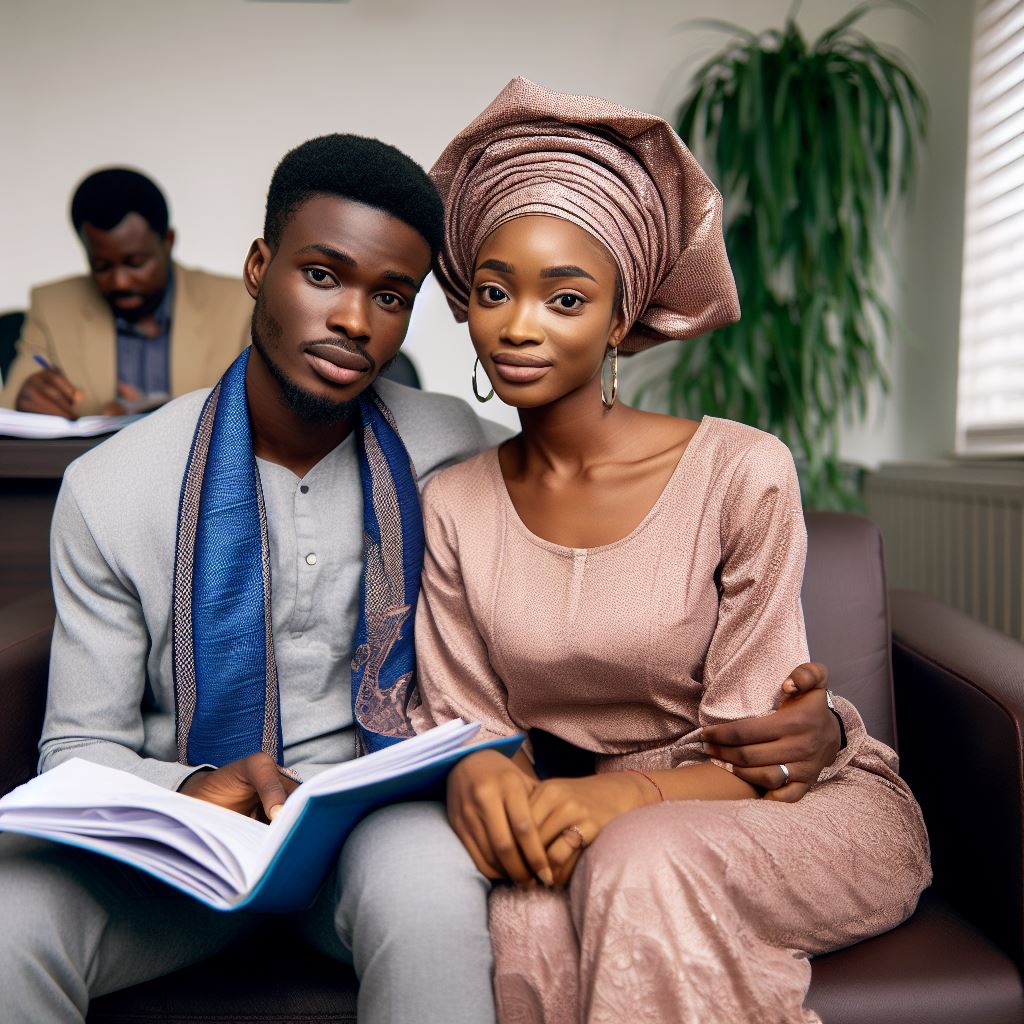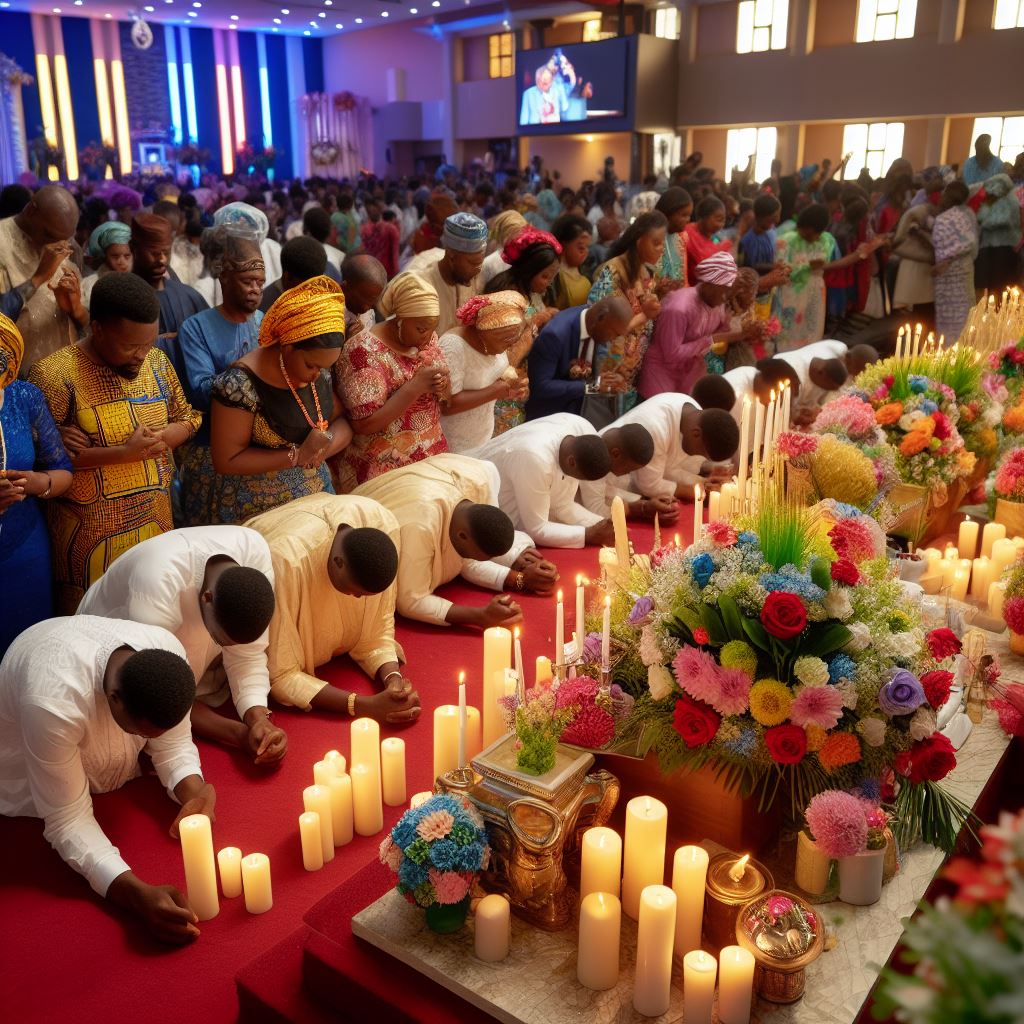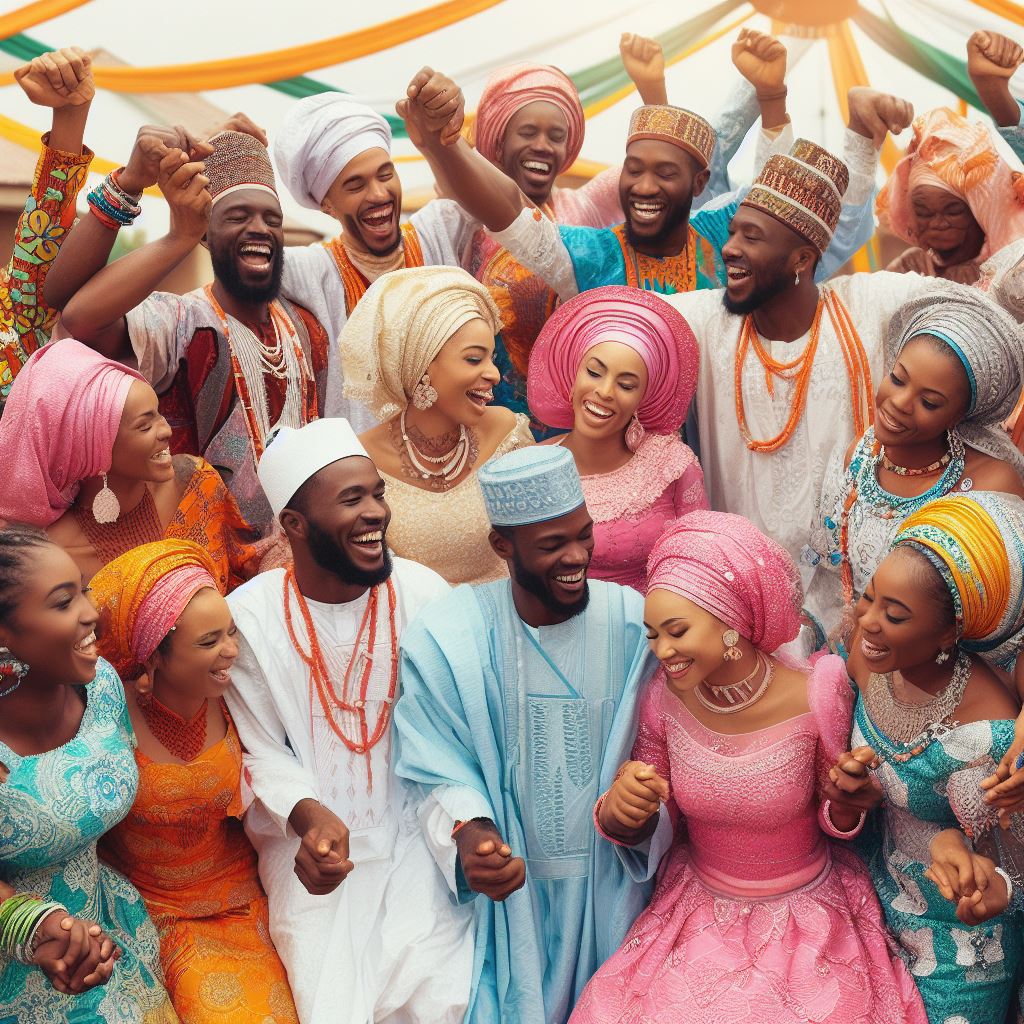Introduction
A. the importance of marriage counseling in both Western and Nigerian societies
Marriage counseling, a critical facet of relationships, holds sway in both Western and Nigerian cultures.
In the West, it’s a common resource to navigate complex marital issues. Nigeria, too, values marital harmony and seeks guidance.
This blog post explores the nuanced differences and similarities in approaches to marriage counseling in these two contrasting cultures.
B. Key points to be discussed in the blog post
- Cultural Context: We’ll delve into the cultural foundations shaping counseling practices, examining individualism vs. collectivism.
- Religion’s Role: Uncover how religious beliefs impact counseling strategies, from Christian doctrines to indigenous Nigerian spirituality.
- Family Dynamics: Examine the influence of extended families on counseling dynamics in Nigeria, compared to nuclear family systems in the West.
- Stigma and Taboos: Discuss how social stigmas and taboos surrounding counseling in Nigeria contrast with Western openness.
- Modernization and Change: Explore the evolving landscape of counseling in Nigeria as it aligns with global trends.
By dissecting these aspects, we aim to shed light on the interplay of culture, tradition, and modernization in the realm of marriage counseling.
Western Approaches to Marriage Counseling
In the field of marriage counseling, Western approaches have gained significant popularity and have been widely practiced for decades.
These approaches are characterized by certain key elements that set them apart from traditional Nigerian values.
A. Overview of the common Western approaches to marriage counseling
Western marriage counseling approaches focus on the well-being of individuals within the marital relationship.
They emphasize open communication, mutual respect, and personal growth.
In contrast to traditional Nigerian values, these approaches prioritize the happiness and fulfillment of each individual.
B. Individualism and personal happiness in Western cultures
Western cultures, influenced by individualistic ideologies, place a strong emphasis on personal happiness and fulfillment.
This worldview shapes the foundation of Western marriage counseling, as therapists work to assist individuals in achieving their own happiness within the context of their relationship.
C. Specific techniques used in Western marriage counseling
Western counselors employ various techniques to address marital challenges.
Cognitive-behavioral therapy (CBT) is often used to evaluate and modify negative patterns of thinking and behavior.
Solution-focused therapy focuses on identifying and working towards solutions rather than dwelling on problems.
D. Examples of success stories or case studies from Western marriage counseling practices
Many have benefited from Western marriage counseling approaches.
For instance, a couple struggling with trust issues found success through open communication and implementing CBT techniques.
Another couple overcame financial conflicts by employing solution-focused therapy in their sessions.
The influence of Western approaches on marriage counseling has undoubtedly shaped the landscape of relationship therapy worldwide.
Though these approaches may differ from Nigerian values, their impact cannot be ignored.
Ultimately, the goal of marriage counseling is to foster healthier and more fulfilling relationships, regardless of the cultural context.
Read: Addressing Infidelity: Counseling Advice for Nigerian Marriages
Nigerian Values Related to Marriage
A. Overview of the traditional Nigerian values surrounding marriage and family
Nigeria, known for its diverse cultural heritage, has a rich tradition when it comes to marriage and family.
The values deeply rooted in Nigerian society play a significant role in shaping the approach towards marriage counseling.
In Nigerian culture, marriage is seen as more than just the union of two individuals.
It is considered a joining of families and a reinforcement of community ties.
The traditional values emphasize the importance of maintaining these connections.
In Nigeria, the concept of family goes beyond the nuclear unit.
Extended family plays a crucial role in supporting and contributing to the success and stability of a marriage.
This close-knit network provides a sense of belonging and security.
Moreover, the Nigerian community as a whole actively participates in the lives of married couples.
This involvement extends to providing guidance, advice, and even mediation during challenging times.
The support of the community is considered essential for sustaining marital harmony.
B. How Nigerian values prioritize unity, stability, and endurance in marriages
In Nigerian culture, marriage is regarded as a lifelong commitment.
The values upheld by Nigerians prioritize unity, stability, and endurance, even in the face of difficulties.
Divorce is generally discouraged and seen as a last resort.
Couples are expected to work through their problems, seek reconciliation, and find solutions together.
This collective effort is driven by the belief that enduring hardships ultimately strengthens the bond between spouses.
C. Significance of religion and spirituality in the Nigerian context of marriage counseling
Religion and spirituality hold immense importance in Nigerian society.
They influence many aspects of life, including marriage.
During marriage counseling, Nigerian values encourage the incorporation of religious teachings and practices.
Many Nigerians turn to their faith for guidance, solace, and inspiration to resolve marital conflicts.
Spiritual leaders, such as pastors or imams, often play an integral role in providing counseling and support to couples, aligning their approach with religious values.
Basically, the traditional Nigerian values related to marriage, such as the emphasis on extended family, community involvement, unity, stability, and religious beliefs, greatly impact the approach to marriage counseling.
Understanding and respecting these values are key to helping Nigerian couples effectively navigate challenges and strengthen their marriages.
Read: Why Marriage Counseling is Gaining Popularity in Nigeria

Challenges and Misalignments
A. Potential Conflicts and Differences
When Western approaches to marriage counseling are applied in Nigeria, potential conflicts or differences may arise.
Western counseling methods are often based on individualism, self-expression, and personal autonomy, which may clash with Nigerian cultural values that emphasize communalism, respect for authority, and family unity.
For example, Western counselors may promote open communication and encourage couples to express their feelings and disagreements openly.
However, in Nigerian culture, there is often a strong emphasis on respect for elders and avoiding confrontations.
This can create a challenge for Nigerian couples who are expected to follow cultural norms while also trying to address their marital issues through counseling.
B. Potential Challenges Faced by Nigerian Couples
When Nigerian couples are exposed to Western counseling methods that conflict with their cultural values, several challenges can emerge.
Firstly, there may be a resistance to individual-focused therapy, as Nigerian couples typically prioritize family and community interests over personal desires.
Additionally, there may be a lack of trust or discomfort in discussing intimate details of their relationship with a stranger, which is a common practice in Western counseling.
Privacy and confidentiality hold significant importance in Nigerian culture, and sharing private matters outside the family might be seen as a breach of trust.
Moreover, concepts like divorce or separation, which are more openly considered in Western societies, may be seen as taboo or unacceptable in Nigerian culture.
The counseling approach that allows for these outcomes may not align with the cultural values of commitment and perseverance in marriage.
C. Miscommunications and Misunderstandings
Cultural gaps between Western counselors and Nigerian couples can lead to miscommunications and misunderstandings during counseling sessions.
Differences in language, idioms, and cultural references may hinder effective communication and hinder the therapeutic process.
Additionally, non-verbal cues and expressions may be interpreted differently, causing misunderstandings between the counselor and the couple.
Gestures, body language, and eye contact may carry different meanings in Nigerian culture compared to Western cultures, leading to confusion or misinterpretation of intentions.
D. Illustration of Challenges and Misalignments
Consider a scenario where a Nigerian couple seeks counseling due to a lack of communication in their marriage.
The Western counselor encourages them to openly express their thoughts and feelings.
The couple, however, may hesitate to share personal intimate details as it goes against their cultural norms of privacy and respect for elders.
In another example, a Nigerian couple faces difficulties in their relationship.
The Western counselor suggests considering separation or divorce as an option.
This suggestion may not align with the couple’s cultural values of commitment and perseverance in marriage, creating a significant misalignment in counseling goals.
The aforementioned scenarios highlight the challenges Nigerian couples face when exposed to Western counseling methods that conflict with their cultural values.
It emphasizes the need for counselors to be aware of and sensitive to cultural differences in order to provide effective and culturally appropriate therapy.
Essentially, applying Western approaches to marriage counseling in Nigeria can lead to conflicts, challenges, and misalignments with the prevailing cultural values.
Identifying these potential issues and addressing them with cultural sensitivity is crucial in providing effective counseling for Nigerian couples.
Read: Success Stories: Nigerian Couples Transformed by Counseling
Balancing Approaches
In the previous sections, we explored the differences between Western counseling techniques and Nigerian values when it comes to marriage counseling.
In this section, we will discuss the importance of finding a balance and explore ways to combine Western approaches with Nigerian values and traditions.
1. Cultural Sensitivity: A Key Component
One of the fundamental aspects of successful marriage counseling is cultural sensitivity.
It is crucial for counselors to understand and respect the Nigerian context, including its values, beliefs, and traditions.
By doing so, the counselor can create a safe and non-judgmental environment for Nigerian couples seeking help.
2. Adapting Counseling Methods to Suit the Nigerian Context
While Western counseling techniques may be effective in many cases, they often need modifications to align with Nigerian values.
For example, individualistic approaches may need to be adjusted to include the entire family or community in the counseling process.
Nigerian culture emphasizes the importance of collectivism and the interconnectedness of relationships.
3. Incorporating Nigerian Values into Counseling Techniques
Instead of disregarding Nigerian values, it is essential to find ways to incorporate them into Western counseling techniques.
For instance, exploring the concept of “ubuntu” – the belief in a universal bond of sharing that connects all of humanity – can enhance the effectiveness of counseling sessions.
It emphasizes empathy, compassion, and communal support.
4. Alternative Approaches or Modifications
While Western approaches dominate the field of marriage counseling, it is crucial to be open to alternative approaches that align with Nigerian values.
For example, traditional African practices like communal counseling, where multiple couples share their experiences within a group setting, can be an effective way to address marital issues within the Nigerian context.
5. Successful Approaches: Balancing Western and Nigerian Perspectives
There have been several successful marriage counseling approaches that have effectively balanced Western and Nigerian perspectives.
For instance, combining cognitive-behavioral therapy techniques with Yoruba traditional rituals has shown positive results in resolving conflicts and improving communication within Nigerian couples.
6. Case Study: Integrating Family Dynamics
In one case study conducted in Lagos, Nigeria, a marriage counselor successfully integrated Western counseling techniques with Nigerian values.
The counselor recognized the importance of including the extended family in the counseling process, allowing for better understanding of the couple’s dynamics and providing a more comprehensive approach to the issues at hand.
7. The Importance of Continual Learning and Adaptation
As the field of marriage counseling continues to evolve, it is crucial for counselors to engage in continual learning and adaptation.
By staying informed about advancements in both Western and Nigerian counseling practices, professionals can better serve their Nigerian clients and ensure the effectiveness of their counseling methods.
Effectively balancing Western counseling approaches with Nigerian values is a key component of successful marriage counseling in Nigeria.
By being culturally sensitive, adapting counseling methods to suit the Nigerian context, and incorporating Nigerian values into Western techniques, counselors can provide effective support to Nigerian couples.
It is through this balance that lasting change and healthier relationships can be achieved.
Read: Traditional vs. Modern Approaches: Marriage Counseling in Nigeria
Conclusion
This blog post has highlighted the differences between Western approaches and Nigerian values in marriage counseling.
It has emphasized the importance of finding a balance between these two perspectives for effective counseling outcomes.
Marriage counseling that respects and integrates the cultural backgrounds of individuals and couples is encouraged.
By doing so, counselors can create a safe and supportive environment that acknowledges and values the unique experiences and beliefs of their clients.
It is vital to recognize that what may work in Western cultures may not necessarily be applicable or effective in Nigerian marriages, and vice versa.
Therefore, a holistic and culturally sensitive approach is key.
By incorporating both Western approaches and Nigerian values, marriage counselors can ensure that their clients receive the most effective and relevant guidance.
This balance allows for a comprehensive understanding of the dynamics within a marriage, resulting in more positive and lasting outcomes.
In the end, individuals and couples seeking marriage counseling should actively seek out counselors who are knowledgeable and respectful of their cultural backgrounds.
This will ensure that their unique needs are met and that their values are considered throughout the counseling process.
All in all, a balanced approach that combines Western approaches with Nigerian values in marriage counseling will lead to more effective outcomes and stronger, healthier relationships.




